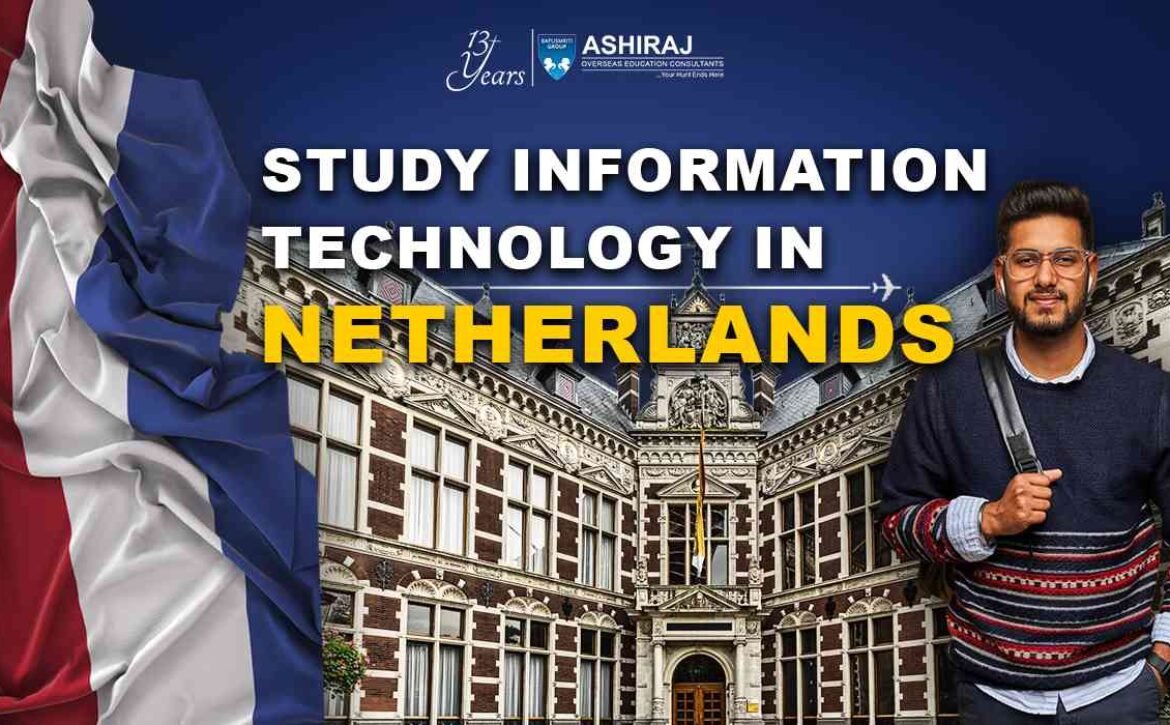
Information Technology in Netherlands
Information technology in the Netherlands encompasses a dynamic landscape marked by innovation, robust infrastructure, and a tech-savvy populace. With its progressive policies and advanced digital infrastructure, the Netherlands has emerged as a frontrunner in the global IT arena. From Amsterdam’s bustling tech startup scene to Eindhoven’s renowned technology hub, the country fosters a vibrant ecosystem for IT development and entrepreneurship. Companies like Philips, Booking.com, and ASML are among the prominent players driving technological advancements and digital transformation in various sectors.
The Netherlands’ commitment to digitalization is evident in its government initiatives promoting e-government services, smart cities, and cybersecurity. With a strategic focus on research and development, the country continues to attract top talent and investments in emerging technologies such as artificial intelligence, blockchain, and quantum computing. Leveraging its strategic location, skilled workforce, and collaborative networks, the Netherlands remains at the forefront of shaping the future of information technology on both regional and global scales.
Why to Study Information Technology in Netherlands?
- Cutting-Edge Curriculum: Dutch universities offer innovative and industry-relevant IT programs designed to equip students with the skills needed to thrive in the rapidly evolving tech landscape.
- Internationally Recognized Degrees: Degrees obtained from universities in the Netherlands hold global recognition, enhancing graduates’ employability and opening doors to diverse career opportunities worldwide.
- Multicultural Environment: Studying IT in the Netherlands provides exposure to a multicultural environment, fostering collaboration and networking opportunities with peers from around the globe.
- English-Taught Programs: Many IT programs in the Netherlands are taught entirely in English, eliminating language barriers and attracting students from diverse linguistic backgrounds.
- Proximity to Tech Hubs: The Netherlands is home to vibrant tech hubs such as Amsterdam and Eindhoven, offering students access to internships, job opportunities, and networking events within proximity.
- Innovative Research Opportunities: Dutch universities are at the forefront of IT research, providing students with opportunities to engage in cutting-edge research projects and collaborate with leading academics and industry professionals.
- High-Quality Education System: The Netherlands boasts a high-quality education system, characterized by modern facilities, experienced faculty, and a student-centered approach to learning.
- Gateway to Europe: Located in the heart of Europe, studying IT in the Netherlands offers easy access to other European countries, providing students with a gateway to explore diverse cultures and career prospects across the continent.
Top Universities to Study Information Technology in Netherlands
University | QS World University Rankings 2023 | Type of University | Average Annual Fees | Programs Offered |
Delft University of Technology | Top 100 | Public | €2,168 (EU/EEA) | Bachelor’s and Master’s in Computer Science, Electrical Engineering, Information Technology |
University of Amsterdam | Top 150 | Public | €2,209 (EU/EEA) | Bachelor’s and Master’s in Artificial Intelligence, Data Science, Computer Science |
Eindhoven University of Technology | Top 200 | Public | €2,168 (EU/EEA) | Bachelor’s and Master’s in Computer Science, Electrical Engineering, Information Technology |
Leiden University | Top 300 | Public | €2,209 (EU/EEA) | Bachelor’s and Master’s in Computer Science, Data Science, Artificial Intelligence |
Erasmus University Rotterdam | Top 400 | Public | €2,209 (EU/EEA) | Bachelor’s and Master’s in Computer Science, Information Technology, Data Science |
The Netherlands offers a plethora of top-tier universities renowned for their excellence in Information Technology education. Delft University of Technology leads the pack, consistently ranked in the top 100 globally by QS World University Rankings 2023. Its affordable average annual fees and diverse range of programs make it an attractive choice for IT enthusiasts. Following closely is the University of Amsterdam, known for its robust programs in Artificial Intelligence and Data Science. Eindhoven University of Technology stands out for its strong emphasis on practical applications in Computer Science and Electrical Engineering. Leiden University and Erasmus University Rotterdam complete the list, offering comprehensive programs in Computer Science, Data Science, and Information Technology at competitive fees, providing students with ample opportunities to excel in the dynamic field of Information Technology in the Netherlands.
Course Curriculum for Information Technology in Netherlands
- Cutting-Edge Topics: Information technology courses in the Netherlands cover cutting-edge topics such as artificial intelligence, cybersecurity, and data analytics to ensure students are equipped with the latest skills and knowledge.
- Practical Learning: The curriculum emphasizes practical learning through hands-on projects, internships, and industry collaborations, providing students with real-world experience and enhancing their employability.
- Multidisciplinary Approach: Courses often adopt a multidisciplinary approach, integrating aspects of computer science, engineering, and business to offer a holistic understanding of information technology and its applications.
- Focus on Innovation: With the Netherlands being a hub for innovation, IT courses emphasize creativity and innovation, encouraging students to develop innovative solutions to real-world challenges.
- International Perspective: Many programs incorporate an international perspective, exposing students to global trends and fostering cross-cultural collaboration, preparing them for careers in a globalized IT industry.
- Flexible Study Options: Universities offer flexible study options, including part-time and online courses, catering to the diverse needs of students and professionals looking to advance their careers in information technology.
- Industry-Relevant Projects: Students often engage in industry-relevant projects, working closely with companies and organizations to solve practical problems and gain valuable insights into the IT industry.
- Career Development: The curriculum includes modules on career development, helping students enhance their professional skills, build networks, and navigate the job market effectively in the field of Information technology in the Netherlands.
Eligibility Criteria & Admission Requirements for MS in Information Technology in Netherlands
- Language Proficiency: Applicants are required to demonstrate proficiency in English by submitting either IELTS or TOEFL scores. The minimum required scores for IELTS are 6.5 overall with no band less than 6.0, while for TOEFL, a score of 90 or above is typically required.
- Standardized Tests: Depending on the university and program, applicants may need to submit GRE or GMAT scores. The minimum required scores for GRE are typically around 155 for both verbal and quantitative sections, while for GMAT, a score of 600 or above is commonly accepted.
Table Format:
Test | Minimum Score |
IELTS | 6.5 Overall, with no band less than 6.0 |
TOEFL | 90 or above |
GRE | Around 155 for both verbal and quantitative sections |
GMAT | 600 or above |
- Documentation: Applicants must provide a valid passport and obtain a student visa for studying in the Netherlands. Additionally, academic certificates demonstrating previous qualifications and transcripts are required for admission consideration.
- Work Experience: While not always mandatory, some programs may require or prefer applicants to have relevant work experience in the field of information technology. Work experience may strengthen an applicant’s candidacy and provide valuable insights into the industry.
Meeting these eligibility criteria ensures that applicants are well-prepared to pursue studies in Information technology in the Netherlands, fostering a diverse and qualified cohort of students in the field.
Documents Required for Studying Information Technology in Netherlands
- Passport: A valid passport is essential for international students applying to study Information technology in the Netherlands, serving as proof of identity and nationality.
- Letters of Recommendation (LOR): Two letters of recommendation from academic or professional referees are typically required to assess the applicant’s academic and personal qualities.
- Statement of Purpose (SOP): An SOP provides insight into the applicant’s academic and career goals, explaining why they are interested in studying Information technology in the Netherlands and how it aligns with their aspirations.
- Curriculum Vitae (CV): A detailed CV outlines the applicant’s educational background, work experience, skills, achievements, and any relevant extracurricular activities.
- Official High School Transcripts and Educational Certificates: Transcripts and certificates from high school or previous educational institutions are required to verify academic qualifications.
- Work Experience Certificate: If applicable, a work experience certificate demonstrating relevant professional experience in Information technology may be requested by universities or immigration authorities.
- Proof of Financial Resources: Proof of sufficient financial resources is necessary to cover tuition fees, living expenses, and other costs associated with studying in the Netherlands. This may include bank statements, scholarship letters, or sponsor letters.
Submitting these documents ensures that applicants meet the requirements for admission to Information technology programs in the Netherlands, facilitating a smooth application process and enrollment into desired courses.
Admission Process for Information Technology in Netherlands
- Research Programs: Begin by researching Information technology programs offered by universities in the Netherlands, considering factors such as curriculum, faculty, facilities, and location.
- Check Eligibility: Review the eligibility criteria for each program, ensuring you meet requirements regarding academic qualifications, language proficiency (IELTS or TOEFL), and standardized test scores (GRE or GMAT).
- Prepare Documents: Gather required documents, including passport, letters of recommendation, statement of purpose, curriculum vitae, official transcripts, educational certificates, work experience certificate (if applicable), and proof of financial resources.
- Submit Application: Complete the online application form for your chosen programs, providing accurate information and uploading all necessary documents according to the university’s instructions.
- Pay Application Fee: Pay the application fee as per the university’s guidelines, ensuring timely submission to avoid any delays in the processing of your application.
- Await Decision: After submitting your application, wait for the university to review your materials and make an admission decision. This process may take several weeks, so be patient.
- Accept Offer: If offered admission, carefully review the terms and conditions of the offer, including deadlines for accepting admission and paying any required deposits.
- Apply for Visa: Once you have accepted the offer, begin the process of applying for a student visa (if required) by gathering necessary documents and following the instructions provided by the Dutch embassy or consulate.
- Prepare for Arrival: Upon receiving your visa, make arrangements for travel, accommodation, and any other logistics to prepare for your arrival in the Netherlands to commence your studies in Information technology.
“Education is the most powerful weapon which you can use to change the world.”
Nelson Mandela
Cost of Information Technology Course in Netherlands
- Tuition Fees: The cost of tuition for Information technology programs in the Netherlands varies depending on the university and level of study. On average, EU/EEA students can expect to pay around €2,000 to €3,000 per year, while non-EU/EEA students may pay higher fees, ranging from €8,000 to €15,000 per year.
- Living Expenses: Living expenses in the Netherlands include accommodation, food, transportation, books, and personal expenses. On average, students should budget around €800 to €1,200 per month for living costs, depending on their lifestyle and location.
- Health Insurance: All students in the Netherlands are required to have health insurance, which typically costs around €80 to €100 per month. EU/EEA students may be eligible for Dutch public health insurance, while non-EU/EEA students may need to purchase private insurance.
- Additional Costs: Other expenses to consider include visa application fees, residence permit fees (if applicable), study materials, social activities, and travel within Europe.
- Scholarships and Financial Aid: Students pursuing Information technology in the Netherlands can explore scholarships, grants, and financial aid opportunities offered by universities, government organizations, and external funding bodies to help offset the cost of studying.
Understanding the cost of studying Information technology in the Netherlands is essential for prospective students to plan their finances and make informed decisions regarding their education abroad.
Scholarships for Information Technology Courses in Netherlands
Scholarship Name | Amount | Application Deadline |
Holland Scholarship | €5,000 to €15,000 | Varies (February-April) |
Orange Tulip Scholarship (OTS) | Varies | Varies (January-March) |
Erasmus+ Scholarship | Varies | Varies (Check specific program) |
Netherlands Fellowship Program | Full tuition, living allowance, insurance, visa costs | Varies (Check specific program) |
Amsterdam Excellence Scholarship | €25,000 to €30,000 | 15 January (annual) |
Information technology in the Netherlands offers various scholarship opportunities to support international students pursuing their studies. The Holland Scholarship provides financial support ranging from €5,000 to €15,000, with application deadlines typically falling between February and April. The Orange Tulip Scholarship (OTS) offers varying amounts and deadlines from January to March. The Erasmus+ Scholarship and Netherlands Fellowship Program provide comprehensive support, covering tuition, living expenses, insurance, and visa costs, with application deadlines depending on specific programs. Additionally, the Amsterdam Excellence Scholarship offers substantial funding of €25,000 to €30,000 with an application deadline of 15 January annually. Prospective students are encouraged to explore these scholarship options to alleviate the financial burden of studying Information technology in the Netherlands.
Career Opportunities After Information Technology in Netherlands
Job Profile | Average Salary (per year) |
Software Developer | €45,000 – €70,000 |
Data Analyst | €40,000 – €60,000 |
IT Consultant | €50,000 – €80,000 |
Cybersecurity Analyst | €55,000 – €85,000 |
Systems Administrator | €40,000 – €65,000 |
Information technology in the Netherlands offers a wide range of career opportunities with competitive salaries. Software developers, responsible for designing and developing software applications, earn an average salary ranging from €45,000 to €70,000 per year. Data analysts, who analyze and interpret complex data sets, can expect to earn between €40,000 and €60,000 annually. IT consultants, providing strategic advice and solutions to businesses, typically earn salaries ranging from €50,000 to €80,000 per year. Cybersecurity analysts, responsible for protecting organizations’ digital assets, earn an average salary of €55,000 to €85,000 annually. Systems administrators, managing and maintaining IT systems and networks, earn salaries ranging from €40,000 to €65,000 per year. With a strong demand for skilled IT professionals, pursuing a career in Information technology in the Netherlands offers excellent earning potential and growth opportunities.
Frequently Asked Questions About Information Technology in Netherlands
Some of the top universities in the Netherlands for Information technology include Delft University of Technology, University of Amsterdam, and Eindhoven University of Technology.
Yes, there are scholarships available for international students, such as the Holland Scholarship, Orange Tulip Scholarship, and Erasmus+ Scholarship, among others.
Admission requirements usually include academic transcripts, language proficiency tests (IELTS or TOEFL), standardized test scores (GRE or GMAT), letters of recommendation, and a statement of purpose.
The cost varies depending on the university and program, but on average, EU/EEA students can expect to pay around €2,000 to €3,000 per year, while non-EU/EEA students may pay higher fees.
Yes, many universities in the Netherlands offer Information technology programs taught entirely in English to cater to international students.
Information technology graduates in the Netherlands have excellent career prospects, with opportunities in software development, data analysis, IT consulting, cybersecurity, and systems administration, among others.
While not always mandatory, some programs may prefer or require applicants to have relevant work experience in the field of Information technology.
The duration of programs varies, but typically, a bachelor’s degree takes three to four years to complete, while a master’s degree takes one to two years.
Yes, many universities facilitate internships or practical experiences as part of their Information technology programs to provide students with hands-on learning opportunities.
The process involves gathering necessary documents, such as proof of acceptance from a Dutch university, financial resources, and health insurance, and submitting them to the Dutch embassy or consulate in your home country for visa processing.




